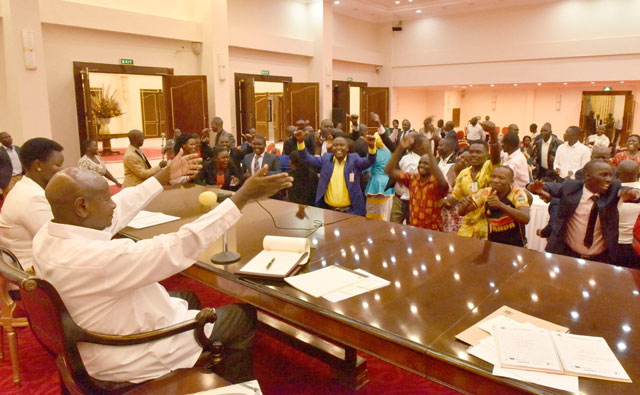
Why young people in East Africa should stop agonising and begin organising
THE LAST WORD | ANDREW M. MWENDA | This week I was in Arusha Tanzania to speak at a conference of youths from East Africa organised by YouLead. They came bustling with the energy and zest. I was impressed by their passion but concerned that energy without proper guidance can be destructive.
My message was simple: if someone wants to help you, they will often tend to tell you what you need to hear but which you may not want to hear – because truths often hurt. But when someone wants to help himself he tells you what you want to hear. Politicians are masters of this. They will tell youths that they are the leaders of tomorrow or even today if only they help themselves win elections and get into power. Be wary of their slogans.
The youths I met in Arusha felt excluded from power. But this was intriguing. Nearly all governments in East Africa come to power through elections. In nearly all our nations over 90% of the voting population are youths. Even those who come to power through armed insurrection need the young as fighters. Therefore youths can gain power directly or influence power indirectly to serve their agenda. Why then does such a powerful majority feel marginalised?
If youths want to lead, they do not need to ask to be given a leadership role in government as a favour from the elderly. They can just need to seize it. All they need is to recognise their potential and prove their mettle in political struggle. Youth should organise, not agonise. They should not blame the elderly for dominating politics; if that is happening it is because youths in East Africa want power to be given to them on a silver platter.
Africa has a rich history of young people taking the lead in consequential political struggles. Many of those who led Africa to independence were in their youths: Julius Nyerere in Tanzania was 39 when he became prime minister, Milton Obote in Uganda was 36, Patrice Lumumba in DRC 36, Kenneth Kaunda 39, etc. Many of their ministers were even younger. Salim Ahmed Salim of Tanzania was 22 when he became ambassador to Egypt and John Kakonge in Uganda became minister at 26.
The second crop of leaders in Africa were the men who came to power via military coups: Joseph Mobutu (28), Muammar Gaddafi (27), Capt Valentine Strasser of Sierra Leone (26), Thomas Sankara of Burkina Faso (34), Murtala Mohamed in Nigeria, (37) Olusegun Obasanjo in Nigeria (39) Yokub Gowan in Nigeria (28), Jerry Rawlings in Ghana (30) and Samuel Doe in Liberia 28.
The third generation of leaders were armed revolutionaries: Yoweri Museveni in Uganda (41) Meles Zenawi in Ethiopia (37), Paul Kagame of Rwanda (36) and Joseph Kabila of DTC (28). In Uganda people like Mugisha Muntu became army commander at 28, Salim Saleh at 26, Kizza Besigye became minister at 28. So there is a time Museveni believed in young people. The point here is that these youths did not sit complaining that they had been excluded from power, pleading with their elders to be given power. They took the political initiative to seize it.
 The Independent Uganda: You get the Truth we Pay the Price
The Independent Uganda: You get the Truth we Pay the Price




1.The youth of today are just feigning madness thats why most of their tranquilizes are now drugs ,sex and participating in activism;Most of the real work in the area of politics,economics and Religion was already sorted in the 194os.For example the cold war shaped the destinations of all first world countries.
2.Why is there a big difference between the youth of then and the ones of now?The likes of M7,Joaquim Chissano,Samaro Machel were passionate about ideology while the likes of Bobi Wine,Julius Malema are just masqueraders of politics.
3.The role models of today’s youth are people like Kyle Jenner,Justine Bebier,Kim Kardashain here in Uganda the youth are inspired by the likes of Bad black ,sheila Gashumaba,Zari can you imagine Sheila Gashumba has more followers on twitter than the Speaker of Parliament ?
It is a pity.
It is very, very sad!!